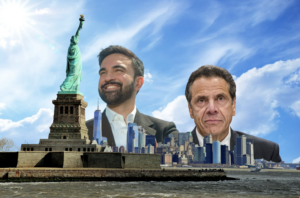It’s the kind of headline that makes you want to scream “why?” into the void: Taylor Swift’s three sold-out Vienna shows were abruptly cancelled yesterday (Thursday) after authorities foiled a terrorist attack targeting the star’s Eras Tour.
The decision — while sensible — has left fans shaken, local businesses bracing, and the broader touring industry spooked. But Swifties still managed to make the most of it, meeting in the streets of Vienna to swap bracelets, sing her tunes, and even get engaged.
So what happened, and what does it mean? Please forgive us, but we owe it to you, dear Intriguer, to answer that question with the help of Taylor Swift’s lyrics:
Stay on top of your world from inside your inbox.
Subscribe for free today and receive way much more insights.
Trusted by 129,000+ subscribers
No spam. No noise. Unsubscribe any time.
Austrian authorities, apparently with a heads-up from US intelligence, say they uncovered a plot by a trio of teenagers (19, 17, and 15) who were radicalised online. Police apparently found explosives, detonators, and a stash of ISIS propaganda at the home of the 19-year-old ringleader, who’d ominously just quit his job after hinting at “something big”.
The foiled attack is a reminder that, despite losing territory in Syria and Iraq, ISIS can still do damage, whether in Paris (2015), Manchester (2017), Iran (January), or Moscow (May). These big attacks drive recruitment, fundraising, and cred among rival jihadis, while aiming to instil fear among ‘enemy’ societies.
In Austria alone, authorities have thwarted at least five ISIS plots since last June. ISIS channels have also made threats against the Euro 2024 across Germany, the Olympics in Paris, and the Cricket World Cup in the US, while name-dropping various other Western cities as being “next?”
It’s all prompted (for example) the FBI director to warn that “the potential for a coordinated attack” on US soil was “increasingly concerning”, while Australia just upped its own terrorist alert to “probable”.
Taylor’s shows aren’t just concerts; they’re cash machines for every city and country lucky enough to host one. To paint you a little picture, here are just some of our favourite examples:
- Last year’s US leg had a big enough economic impact to get a mention in the Fed’s ‘beige book’ (its periodic review of economic conditions)
- The Australian tour drove so much demand from Swifties next door in New Zealand, the national Kiwi carrier had to add surge capacity
- Swift’s exclusive Singapore leg triggered a spat with other countries in the region who missed out, and
- Given the stakes for each host, the prime minister of Canada personally lobbied Swift to add extra stops (which she then did).
So there’s real cash at play here, and unwinding a three-night stop in Vienna is going to hurt: restaurants, hotels, transport, merch, side-trips, plus Austria’s broader effort to brand itself as the place to be.
This was ultimately a close call, with suspects hauled in only hours before the venue doors were scheduled to open.
But the system worked, right? Two decades on from the intelligence failures around the US invasion of Iraq, we’re seeing Western spooks remind wary societies of their worth in some very high-profile ways – whether it’s them repeatedly, publicly, and accurately foreshadowing Putin’s invasion of Ukraine, or saving Swiftie lives in Vienna today.
Oh, and a bonus hopeful note for the weekend? The London mayor says Swift’s Wembley shows will proceed on August 15th to 20th as planned, while Swift’s team reportedly says “she wants to try to return to Vienna as soon as possible”.
INTRIGUE’S TAKE
There are two bigger questions we want to touch on here.
First, a decade or two ago, the big debate in diplomacy and security circles was whether governments were focusing too much on the security challenges posed by terrorism, at the expense of preparing for the strategic challenges posed by the rise of China.
At the risk of casually summarising decades of debate in a single word, the overall answer was ‘yes’. But it was always going to be a careful re-balance, and this week’s events are a reminder of what’s at stake.
The second question is around whether, given how ISIS openly targets not just the West but also the West’s rivals like Iran and Russia, could there be some rare scope for cooperation in response? And yes, there’s reason to be hopeful when you look at the strange bedfellows making up the 87-member anti-ISIS coalition.
But also… maybe not? US intelligence gave a heads-up to both Iran and Russia about ISIS plots earlier this year, but both rivals appear to have shrugged the US off, with catastrophic results.
So to us, it’s all a reminder of a) how strong the centrifugal forces are currently pulling our world into opposing camps, and b) how those rival camps still see more of a threat in each other than in any group like ISIS.
Also worth noting:
- This is only the second time Swift has cancelled a concert. The first was in 2014 when her show in Thailand was cancelled due to a coup.
- Following the Hamas October 7th attacks, ISIS called instead for attacks on the Arab states it says are acting as Israel’s “fortresses and walls”. It then followed up this January with a call for its followers to (again) carry out a global attack campaign.









